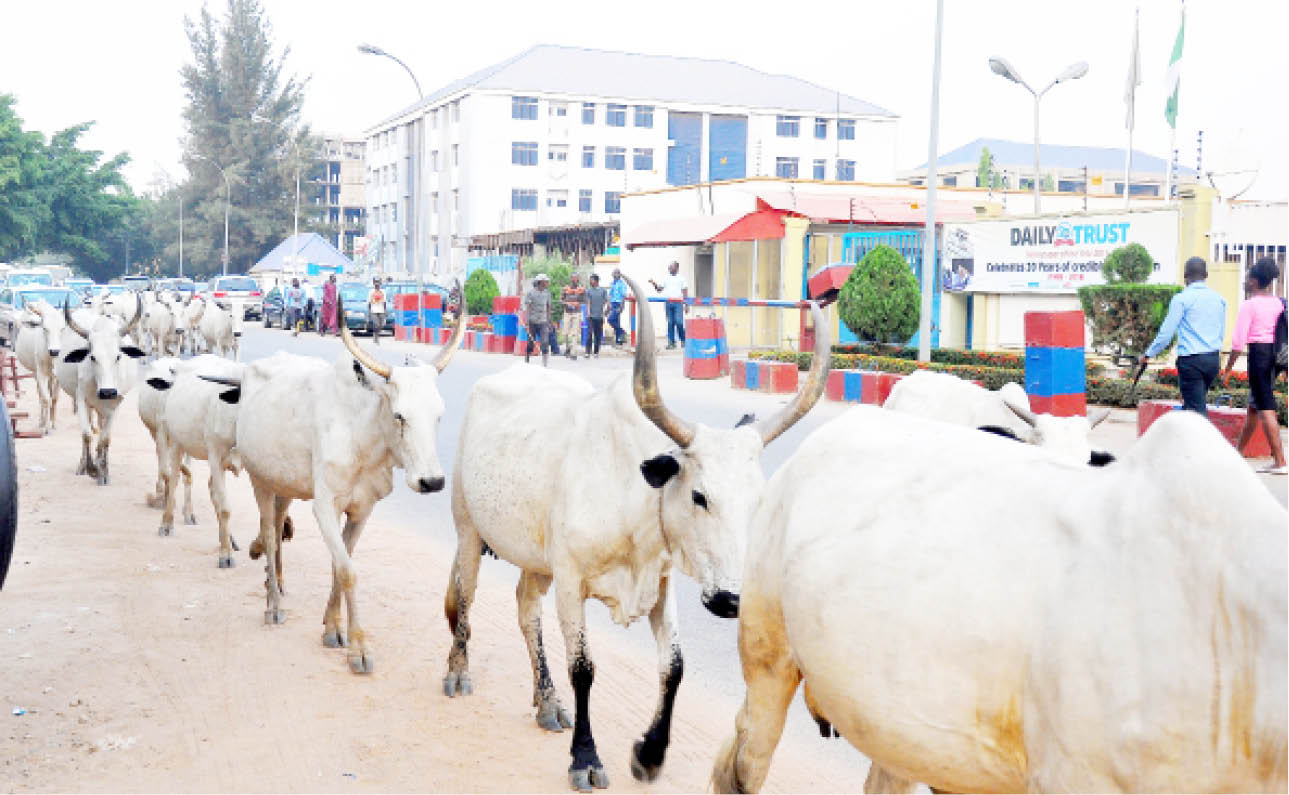Early this year, the Federal Capital Territory Administration banned open grazing at the Federal Capital Territory (FCT), Abuja. The Minister of the FCT, Muhammed Bello, had earlier in 2016, announced a total ban on the activity. But despite the ban, herdsmen defiantly and menacingly graze their cattle in the heart of the city with temerity, Daily Trust reports.
On different highways and streets of the capital city, motorists, pedestrians, commuters and residents are faced with the activities of herders.
The Director, Abuja Environment Protection Agency, Dr Hassan Abubakar, this year had said that the Minister of the FCT, Muhammed Bello, had provided some alternative locations for cattle grazing in Kwali, Kuje and Abaji areas.
- 7 reasons you eat when you’re not hungry
- PODCAST: COVID-19: Nigerians In Denial As Number of Cases Skyrockets
The grazing, our correspondent gathered, is not limited to areas where grasses are found but even streets in the heart of the towns where there are no grasses.
It was also gathered that the practice is a serious threat to food production and security as the animals graze on farms, causing wanton destruction as they eat up crops.
But some of the herders who spoke to our correspondent said they engaged in open grazing despite the ban because they too were indigenes of the FCT and had nowhere else to feed their cattle.
They also claimed that not only had the capital city taken over their grazing lands, they were also scared of going into the bushes because of the spate of insecurity in the country.
According to them, they will only relocate if government provides them with grazing areas with the needed infrastructure for their wellbeing.
Baba Yakubu Mohammed, 65, a Fulani herdsman, said he had been living in Jahi II for more than a decade while his parents had lived for more than a century, herding more than 200 animals, including cows, sheep and goats.
“We are indigenous people of Abuja. We have been inhabiting the place for more than a century. We don’t know any other place apart this place,” he said.
He said that although they were aware that open grazing had been banned in the FCT, they had no option because, “The capital city took over all our grazing lands and blocked the routes where we reared our animals.
“Again, due to the current situation in the country, there is no way we can move our cattle to the bush. As you leave with your animals, criminals will trail you, kill you, alongside your family and rustle all your animals. For us, it’s fire at both ends – town and bush. So, we have no option than to live and graze here. That’s why we are living amidst people.
“If the government can give us a land outside the city, where we will have a grazing area with basic amenities such as schools for our children and health clinic, we won’t hesitate to relocate with our animals and live comfortably.
“We are also worried about the way we are living here. It is not comfortable. Our forefathers were born here. But wherever we settle, we are always driven out of the city. The way things are going in Abuja, one can’t afford to sell one’s herds to buy a plot of land because the price tag is outrageous. Subsequent governments neglected us over the years. We are treated as if we were not real citizens of Nigeria.
“All the places we were living have been sold off. They would just come and evacuate us, alongside our animals. You can see that our homes are just thatched houses. We have lost count of the number of times we have been driven out from one settlement to another.
“We are also Nigerians, with hopes and ambitions for our children. We want them to get quality education and excel in life. Our children are not fortunate to attend school, even though some of them are passionate. We cannot afford school fees for them,” Mohammed said.
He lamented that no nomadic school was built for their children despite the long period of years they had been living in the FCT.
He also explained that Fulani sociopolitical groups, such as the Miyetti Allah Cattle Breeders of Nigeria (MACBAN), had not been representing their interests.
“Neither Miyetti Allah nor any other Fulani group is making case for us here. They have never fought for our interest. We are left to our own fate. They are totally disconnected from us,” he said.
He also said there was no proper channel through which they could tender their demands to the government, apart from the local broadcast media stations that rarely aired their voices.
He said a minor misunderstanding occurred between them and farmers, adding that there are still some grazing bushes around the FCT.
“Sometimes we receive minor complaints from farmers, that our herds encroach into their farms and destroy crops. But we settle the dispute among ourselves,” he said.

Motorists, residents worried
Some Abuja residents who spoke with Daily Trust on the situation said that open grazing had been a source of worry to the public.
A motorist in Utako, Daniel Ayuba, said cattle often caused gridlock on highways while grazing within the Abuja metropolis.
“Cattle rearing in the city of Abuja has continued to constitute worry to residents. I think herders are emboldened by some powerful men in the political circle. That is why they are untouchable despite all the mess they cause in the city. The authorities have banned them from open grazing, yet they boldly roam about and disturb vehicle movement. Many times I had to control my speed to avoid accident due to herds of cattle crossing the road. A vehicle can lose control and everybody would become victims,” he added.
Another resident who simply identified himself as Sami said, “In a model city like the FCT, it is not ideal for cattle and people to be moving together on the roads, especially as this could cause fatal accident. It is the duty of the government to protect the lives of citizens. Government should enforce the ban on open grazing.”
A resident of the FCT, Daniel Kunle, also said, “Abuja is the only capital city where cattle compete with vehicles on the highways. The menace worsens the usual confusion that reckless motorists create on the road. In fact, it is an eyesore.”
Another resident who identified himself as David said,” It is totally wrong. I am a farmer and I own cattle. I make sure I warn my herdsmen not to take the cattle to major roads and people’s farms. There are lots of grazing areas and routes.”
A motorist, Mrs Amina Haruna Kogi said, “Rearing cattle in the streets and highways of a big city like Abuja is not the best because of the risks it exposes motorists, residents and even the cattle to. It also affects the beautification of the city. Government must endeavour to create proper grazing areas for them.”
Another motorist, Robert Okosun said, “It is a serious risk because the animals obstruct traffic at random. Pedestrians and commuters are not safe. Due to their large numbers they lose control and damage people’s property. When they cause havoc, the herders don’t show remorse but attribute it to mistake. There are lots of lands out of town, why do they have to graze in the city? What are the authorities doing about this menace?
Akunnaya Sharon also said, “The situation is annoying and patience-tasking. The delay and accidents caused by the menace call for urgent concern.”
A farmer at Mpape, a suburb of Abuja, Mr Michael Ogaba, 62, said he relied more on farming than his private security job. He lamented that cattle destroyed his cassava farm.
“If one fails to harvest one’s crops in time, from November to December, herders’ cattle will eat up the produce. They usually come on Sundays when people are not many on the farms.
“There was a time they came and destroyed all my cassava worth N100,000. Since then, I lost courage to cultivate cassava. But I still cultivate maize, yam and sorghum. We now monitor our farms very carefully. They also destroyed five other farms.
“We don’t have anywhere to lodge our complaint. Even if you approach them, they would deny that it was their cows that did the destruction, unless you caught them red-handed. And the government is helpless in this matter,” he added.
Musa Hassan, 53, another farmer at Jahi I, who cultivates different types of crops on his two hectares of land, also complained of the destruction open grazing is causing to their farms. According to him, one needs to be constantly on one’s farm to prevent roaming herds from encroaching on it.
“On a daily basis, once you are absent they will push their animals into your farm. Some days ago, I had to exchange words with them. One day, I caught them red-handedly when they were coming out from my farm. But despite the clear evidence, they denied being responsible for destroying my cassava and maize. In fact, they destroyed the whole maize farm. Since I didn’t catch them inside the farm, I could not prove any case against them. So I had to leave the case like that.
“But there was a time I caught them on my farm and reported the matter to their elders. We settled the matter and they compensated me, even though it was too small,” Hassan said.
He said the government had never compensated any farmer whose crops were destroyed by cattle.
“The government does not give you anything, no matter the magnitude of damage done to your farm by cattle. Government is unresponsive and callous about peasant farmers. Sometimes you can get some respite if a case is tabled before the police or traditional leaders and you would be given a paltry sum, but there is no form of compensation or intervention from the government,” he added.
In his response, Abubakar Garba, a Miyetti Allah youth leader in the Abuja Municipal Area Council (AMAC), said government had never provided any alternative grazing route for Fulani herders in Jahi. He lamented that politicians would only come during campaigns and make promises to them – that they would designate a land for them and their animals – but the promises are never fulfilled.
He said, “They come during campaigns and tell us a lot of things that are not real. What perplexes us is that sometimes you would hear political leaders over the media lying that they did some things for us.
“We have been told that some plots of land had been gazetted for us in Karshi, Karu and Paikon Kore. But whenever we go there to inspect the lands, we don’t see anything. They are mere words of mouth. There is no paperwork to that effect. How can you say you would give somebody a piece of land without any certificate of occupancy?”
Garba said that a couple of times, herders had attempted to relocate to other areas around Abuja, but whenever they got there they would be asked to pay outrageous amounts of money to own the land, which they would not afford.
Asked whether they had ever met with the authorities concerned to register their plight, he said, “About five months ago, we went to the Federal Capital Development Authority (FCDA) and tabled our complaints. We were told that they would look into the issues and get back to us, but for six months now, we have not heard anything from them,” he added.
He also said some people had started farming on their lands, which makes their situation more critical.
Responding to the continued open grazing in the FCT despite ban, the chairman of the taskforce on city sanitation, Mr Ikharo Attah, said his men had arrested many herders who flouted the order.
“We have made a series of arrests since last year. Some of the herders have been convicted and fined. We have also gotten a forfeiture order for some of the cows we arrested, but the herders are stubborn, so they still come out to graze in the territory,” he said.
According to him, part of the problem is that the herders are not owners of the cattle, so it is difficult to stop them.
He, however, said the taskforce was tracing the owners to ensure they respect the ban on open grazing in the FCT.
Attah said there were so many areas designated for grazing in the FCT, and urged owners of cattle to ensure they don’t flout the law.
Reacting to the claim that the taskforce has sympathy for the herders, the chairman said, “We demolished a full herders’ colony along the airport road, so how can anybody say we have sympathy for them?
“We don’t have sympathy for anybody who is doing the wrong thing. There’s no sympathy for herders and illegality in the city of Abuja.”
He said his team would sustain its tempo and ensure that the FCT is kept clean.
Clement Adeyi, Terkula Igidi, Dalhatu Liman & Rosemary Etim Bassey

 Join Daily Trust WhatsApp Community For Quick Access To News and Happenings Around You.
Join Daily Trust WhatsApp Community For Quick Access To News and Happenings Around You.


